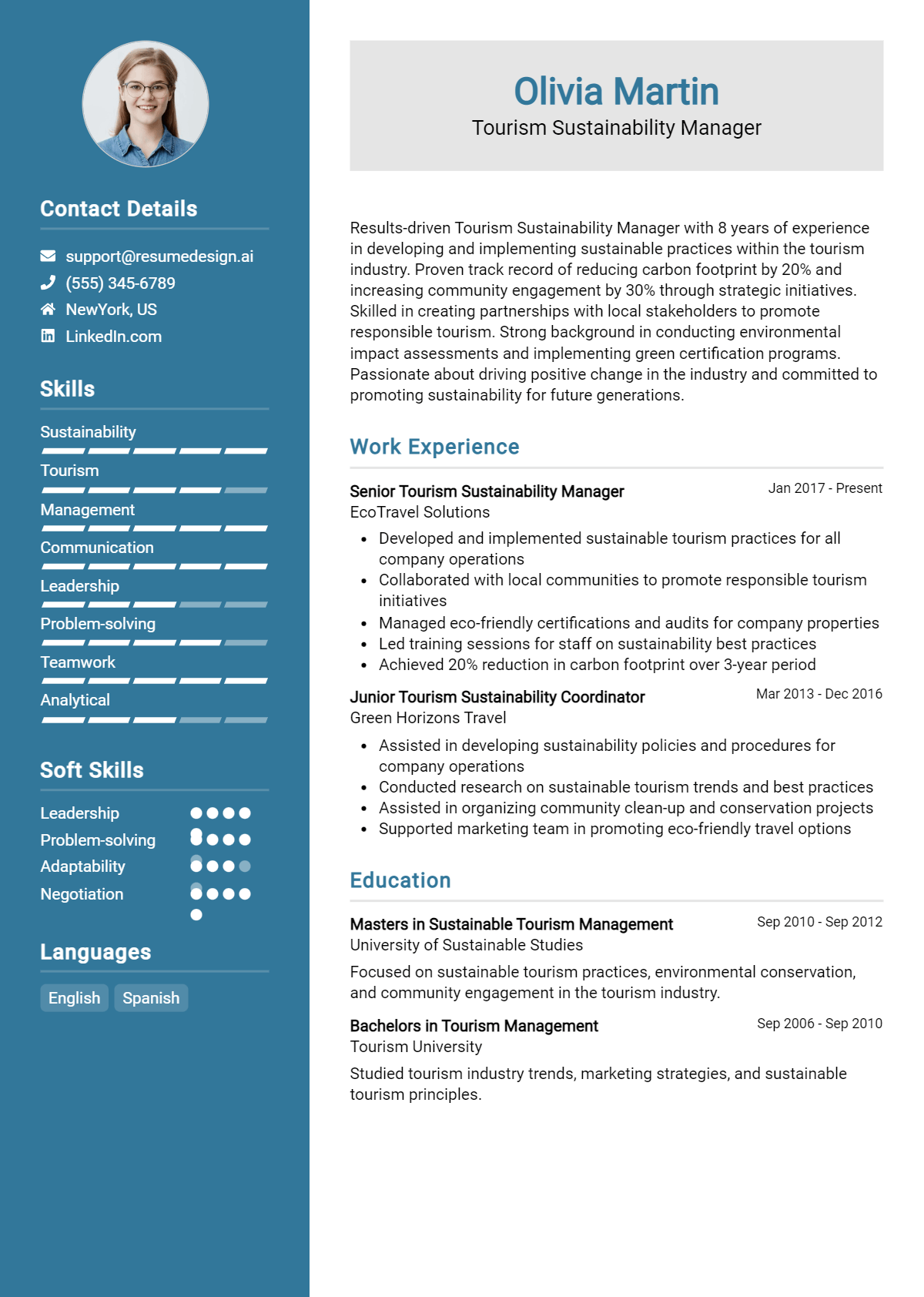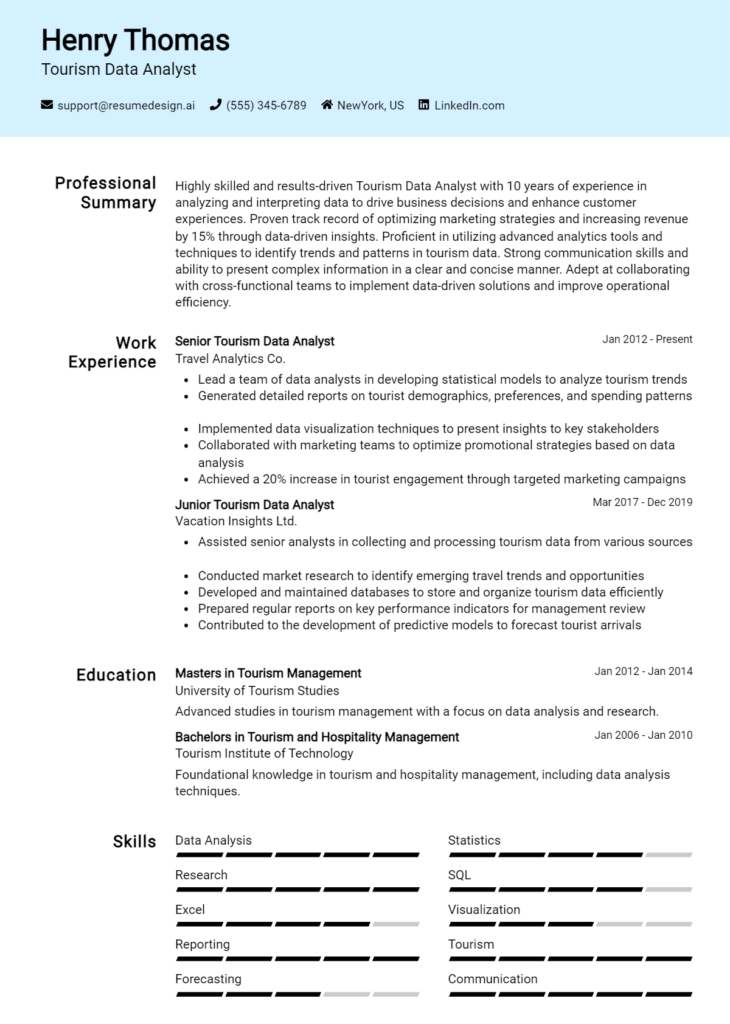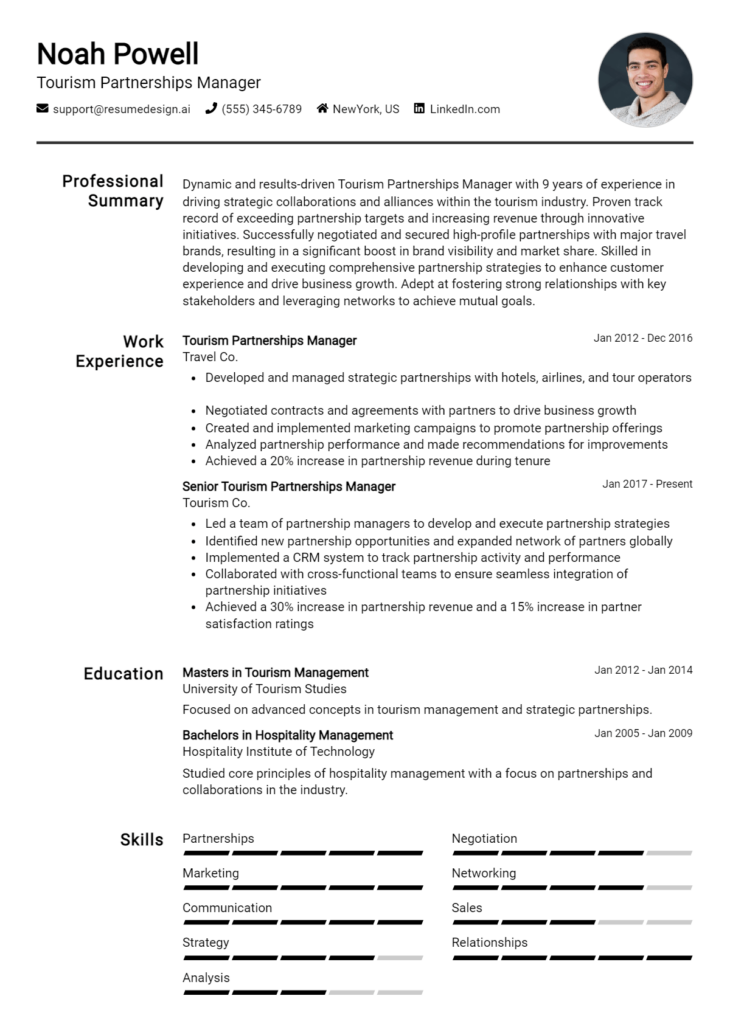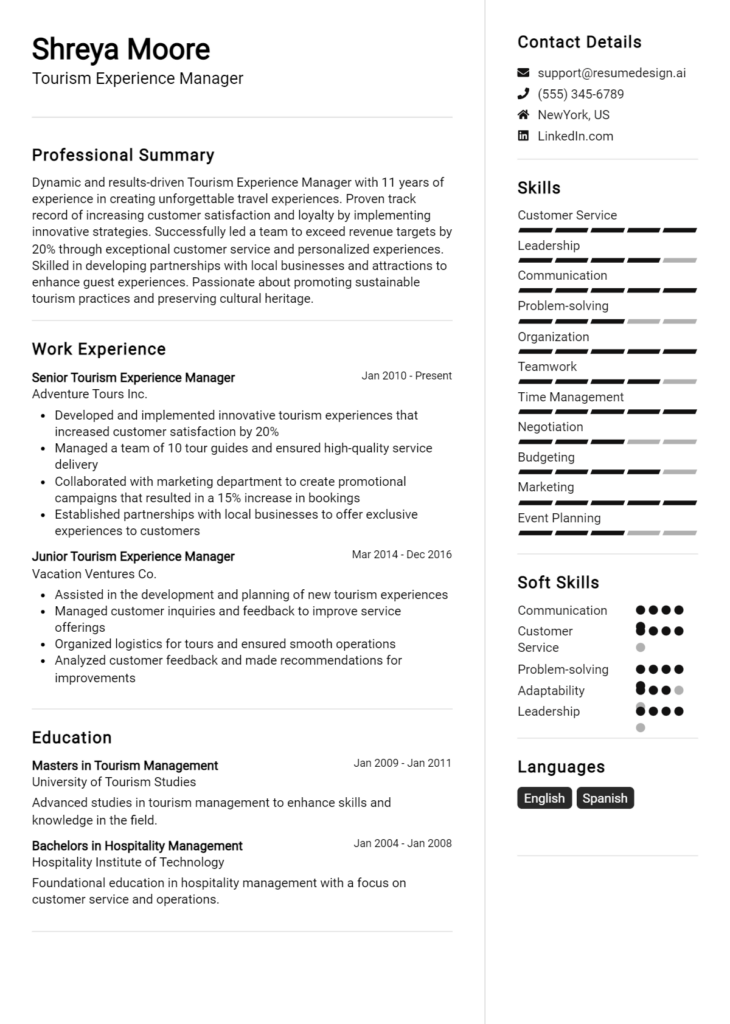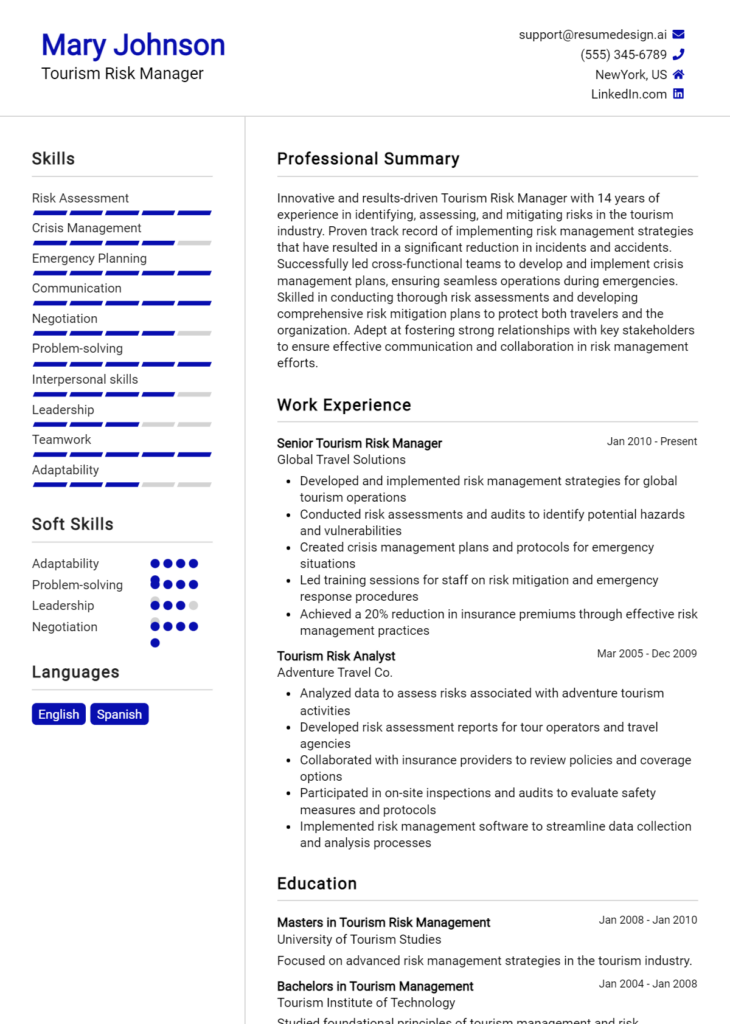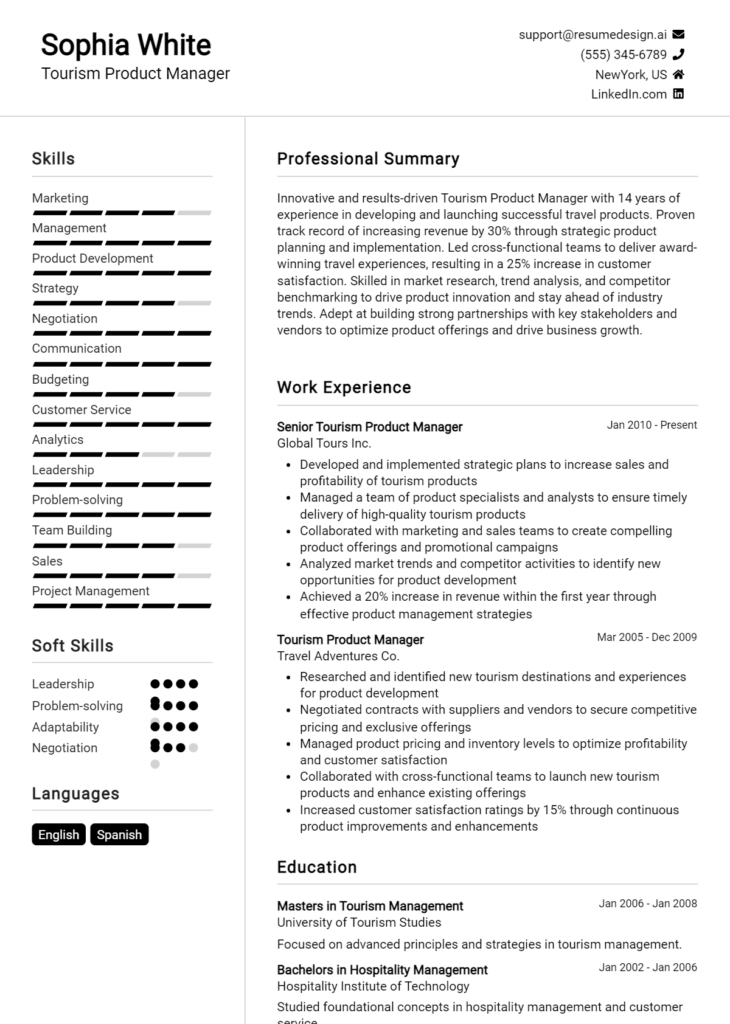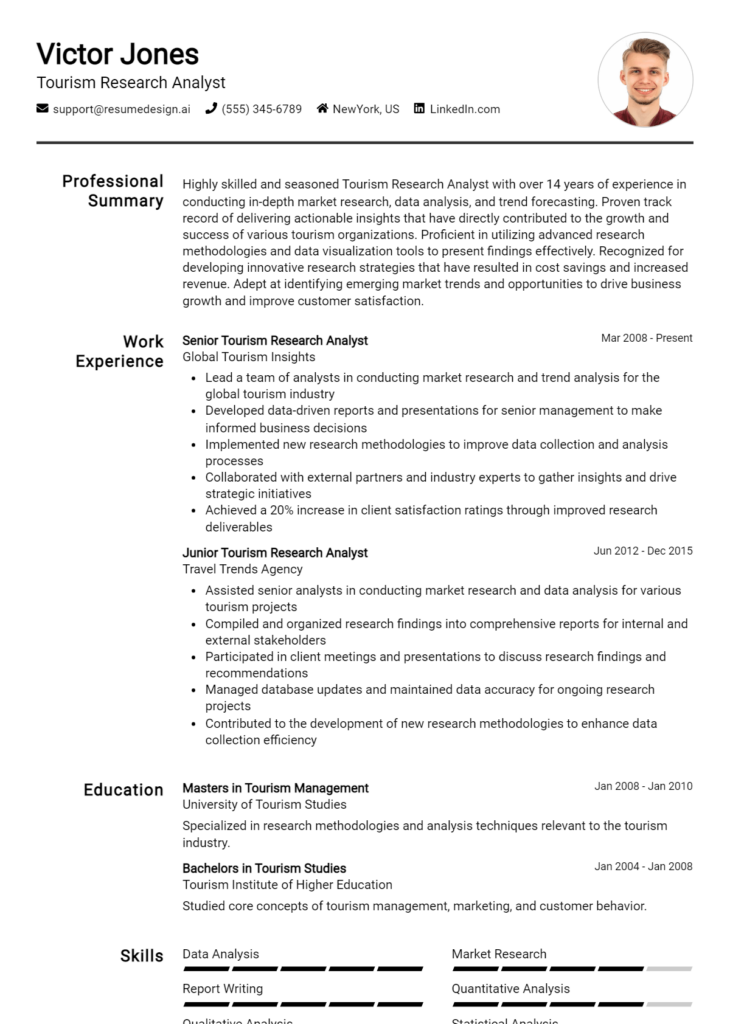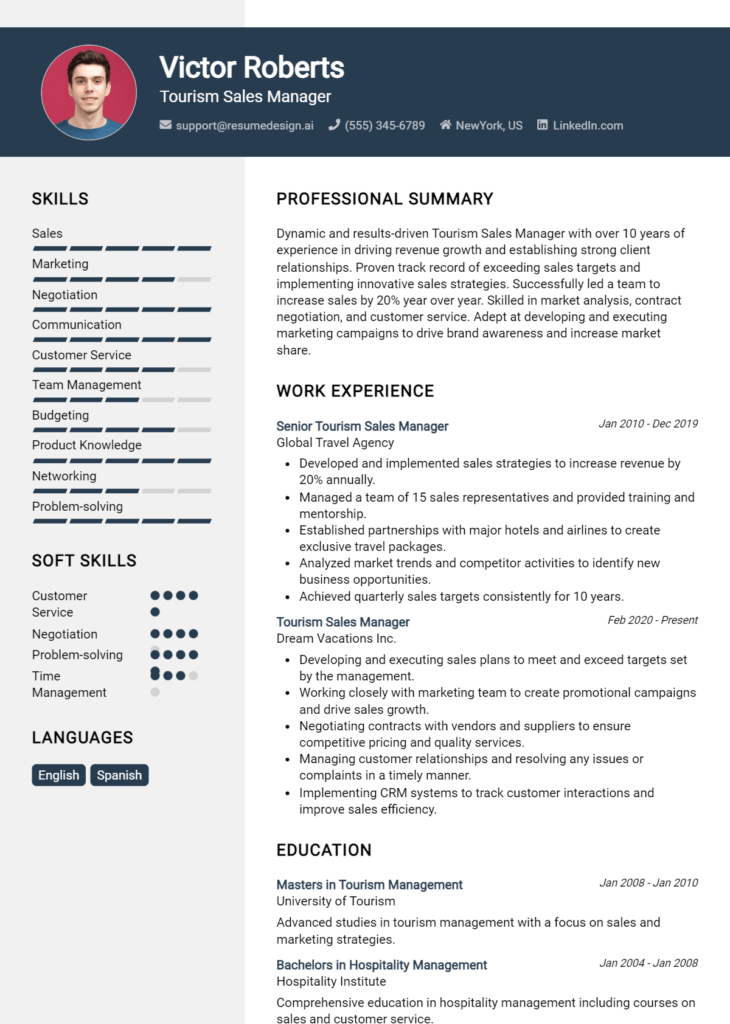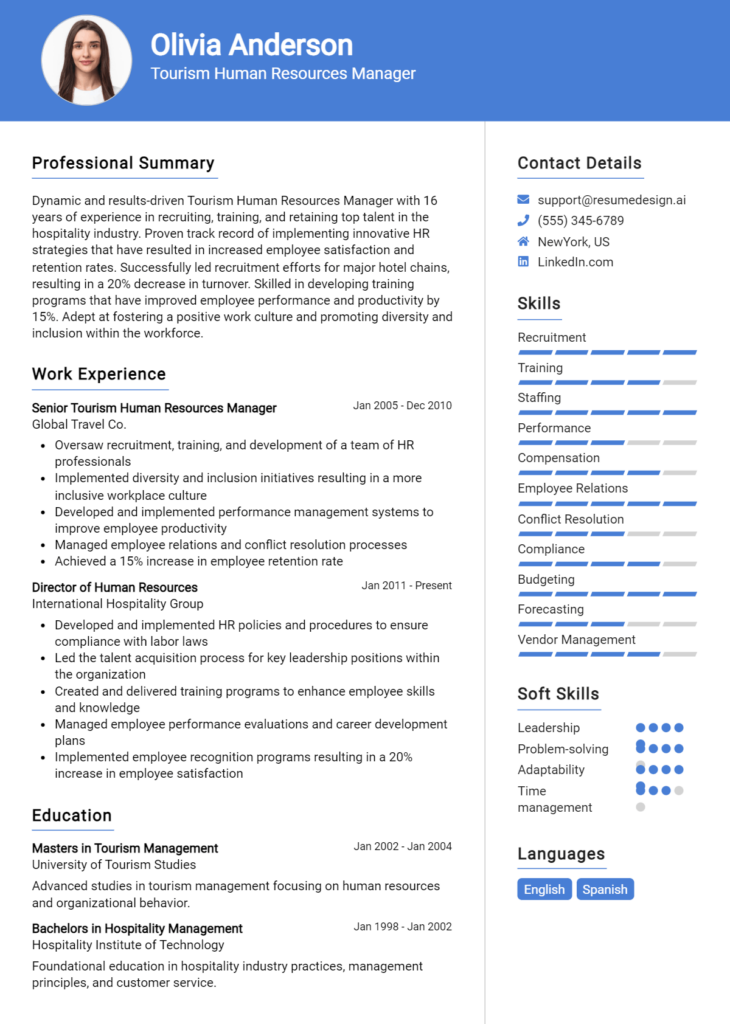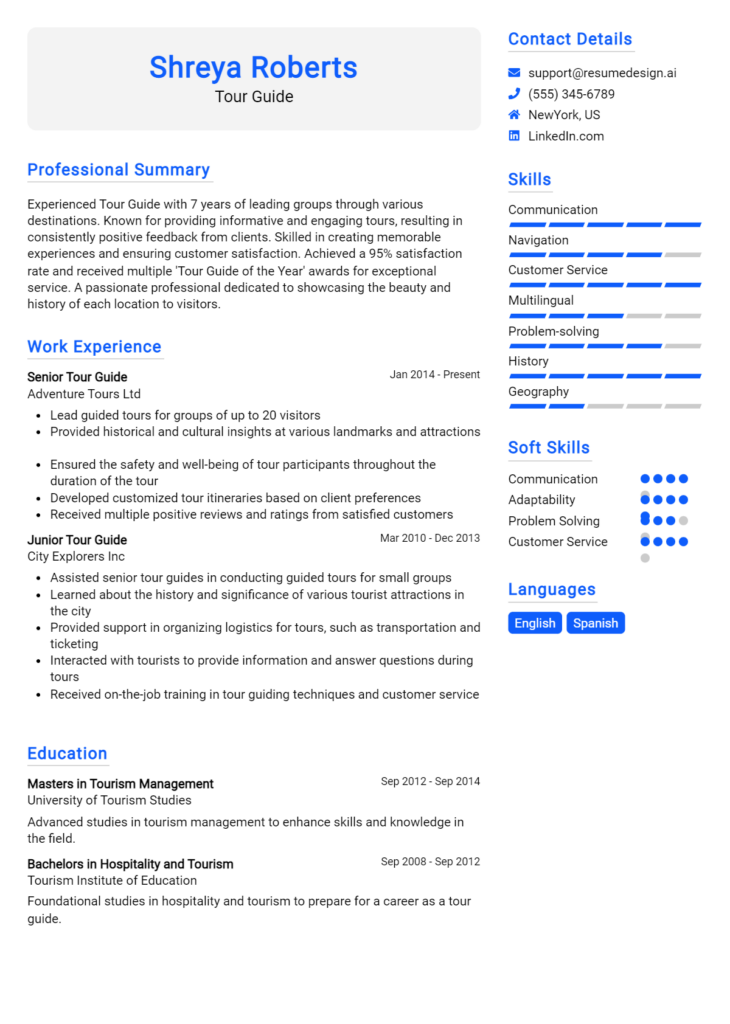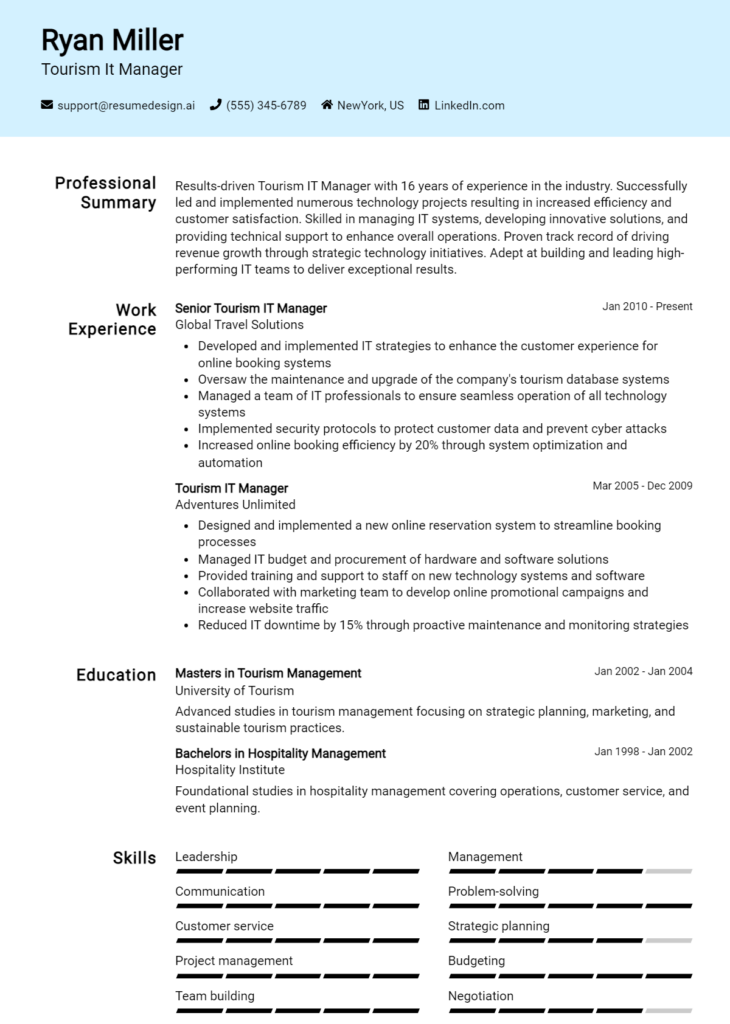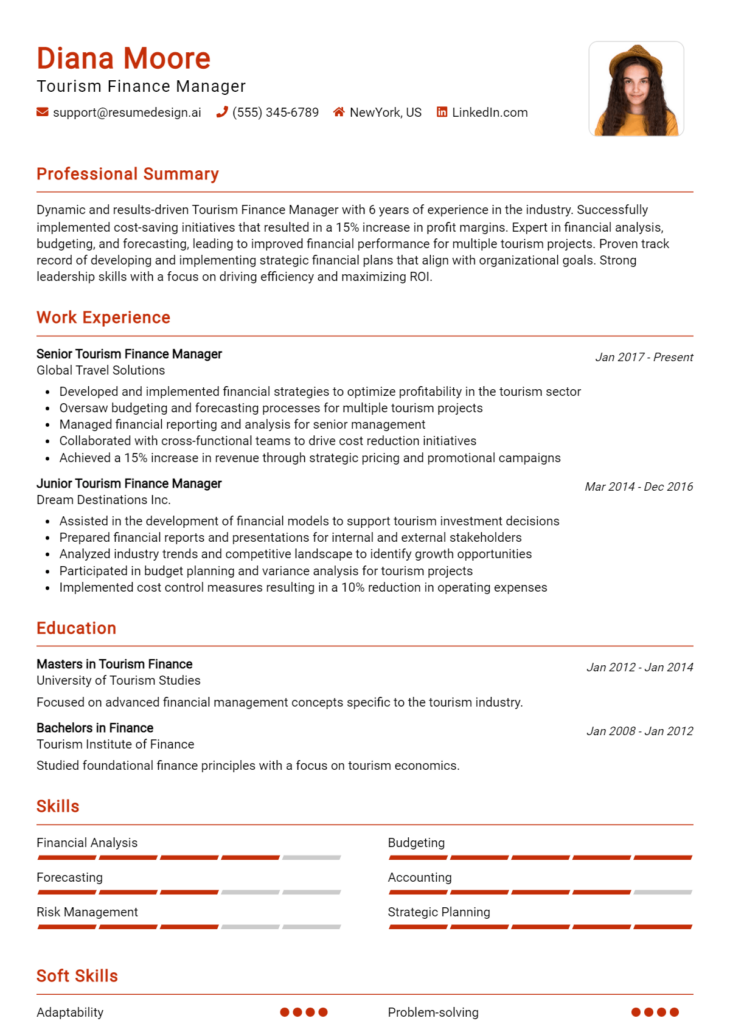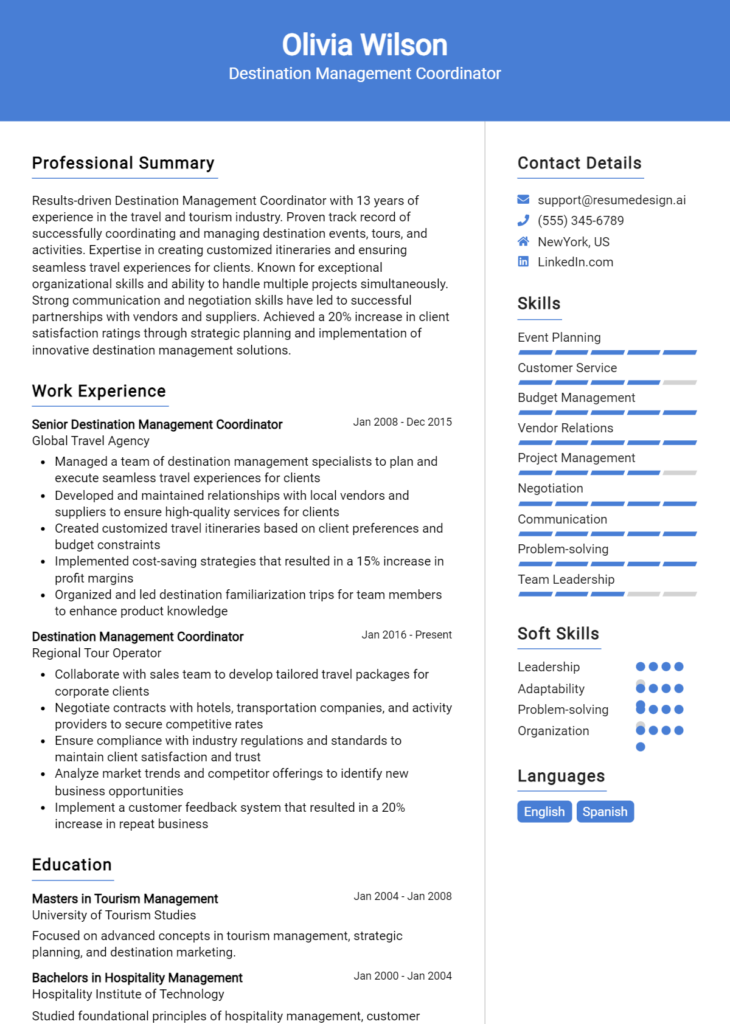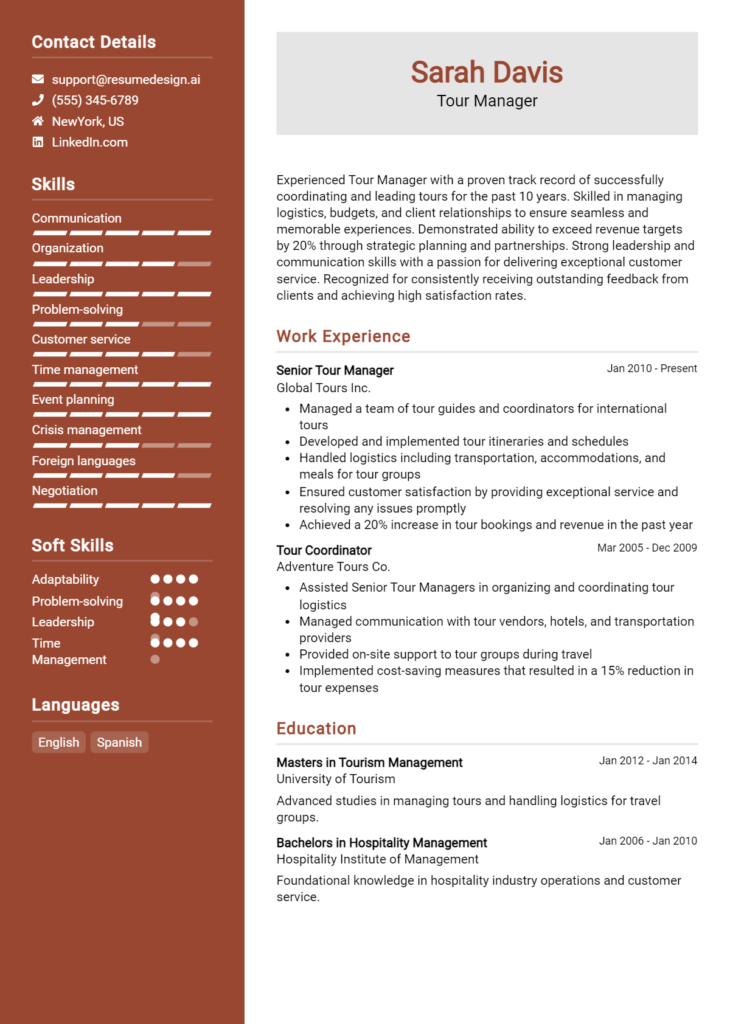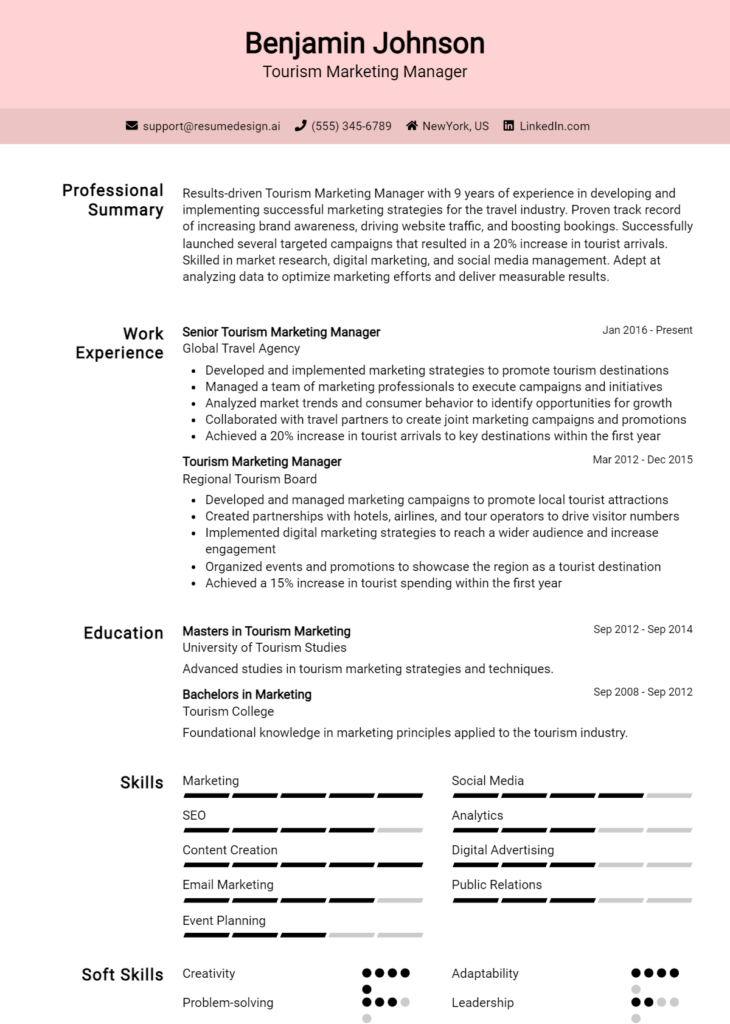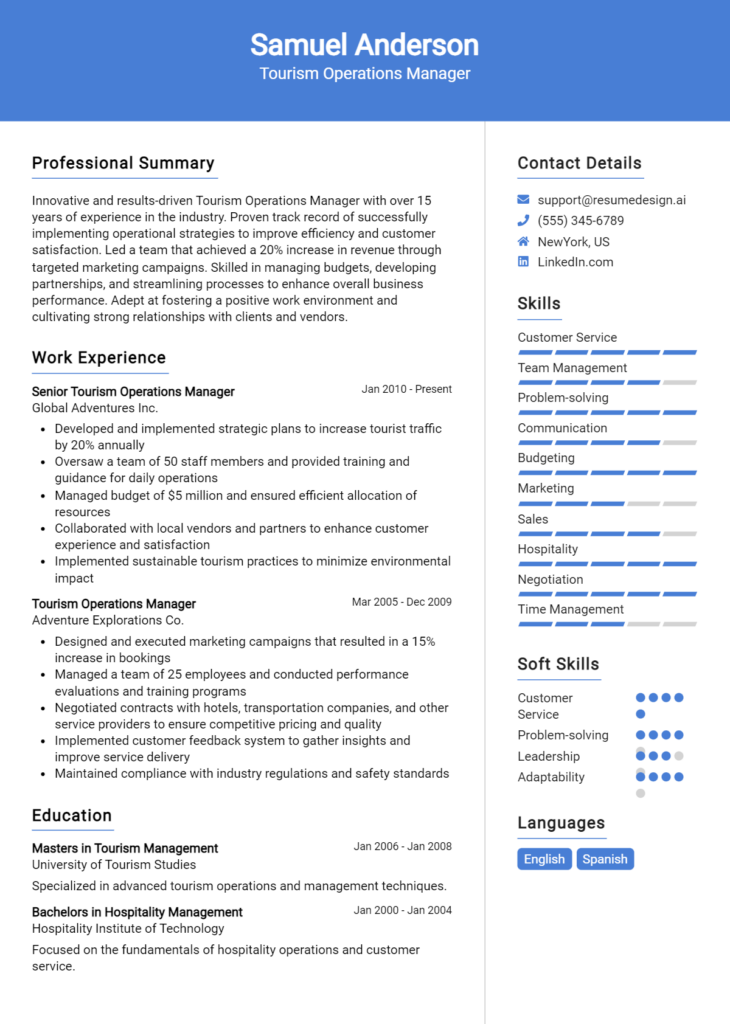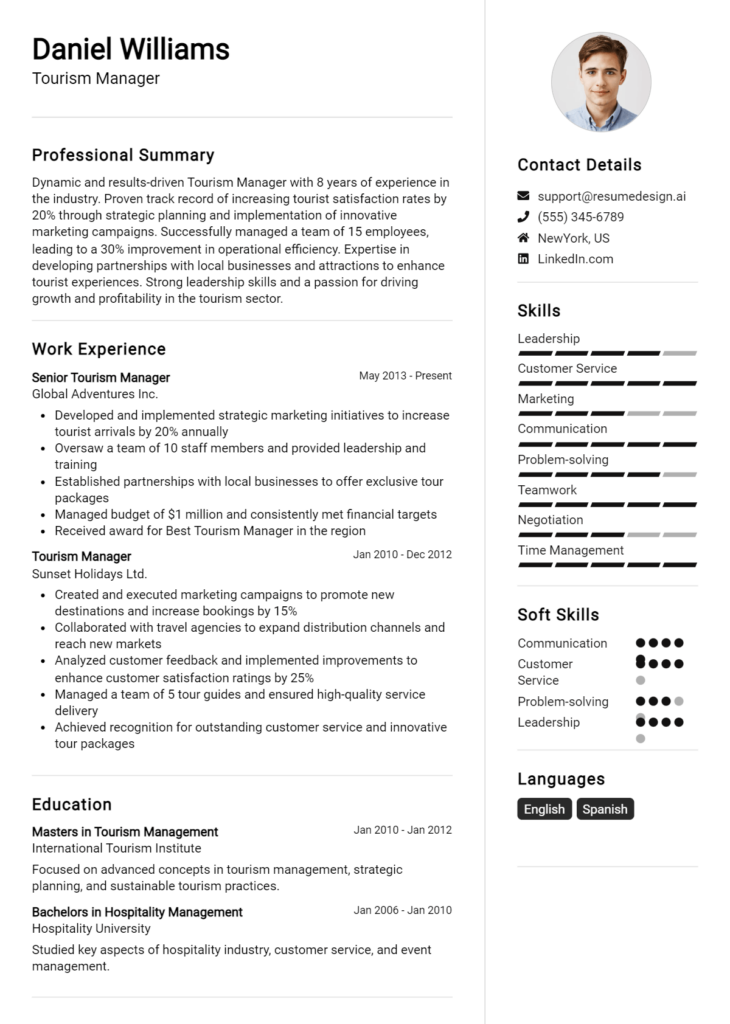Tourism Sustainability Manager Core Responsibilities
A Tourism Sustainability Manager is responsible for developing and implementing sustainable practices within the tourism sector, bridging the gap between environmental stewardship and operational efficiency. This role requires technical knowledge of sustainability principles, strong operational management skills, and problem-solving abilities to address complex challenges. By collaborating across departments, the manager ensures that sustainability initiatives align with the organization’s goals, enhancing its reputation and operational efficiency. A well-crafted resume highlighting these skills can significantly enhance career prospects.
Common Responsibilities Listed on Tourism Sustainability Manager Resume
- Develop and implement sustainability strategies and policies.
- Conduct impact assessments for tourism activities.
- Collaborate with local communities and stakeholders.
- Monitor and report on sustainability performance metrics.
- Educate staff and tourists on sustainable practices.
- Advise on eco-friendly initiatives and projects.
- Manage waste reduction and energy conservation programs.
- Stay updated on sustainability trends and regulations.
- Facilitate training sessions for employees.
- Conduct research to identify best practices in sustainable tourism.
- Engage in policy advocacy for sustainable tourism development.
High-Level Resume Tips for Tourism Sustainability Manager Professionals
In the competitive field of tourism sustainability, a well-crafted resume is essential for professionals looking to make their mark. As the first impression a candidate makes on a potential employer, a resume must effectively showcase both skills and achievements, demonstrating a robust commitment to sustainable tourism practices. For Tourism Sustainability Managers, it's crucial to articulate not only what you've done but how you've positively impacted your previous roles. This guide will provide practical and actionable resume tips specifically tailored for Tourism Sustainability Manager professionals, enabling you to stand out in a crowded job market.
Top Resume Tips for Tourism Sustainability Manager Professionals
- Tailor your resume to match the job description by incorporating relevant keywords and phrases that highlight your expertise in sustainable tourism practices.
- Showcase your relevant experience by including specific roles and responsibilities that align with the Tourism Sustainability Manager position you are applying for.
- Quantify your achievements whenever possible, using metrics such as percentage reductions in carbon footprints, the number of sustainable initiatives implemented, or improvements in guest satisfaction ratings.
- Highlight industry-specific skills, such as knowledge of sustainable practices, stakeholder engagement, or regulatory compliance, to demonstrate your suitability for the role.
- Include certifications related to sustainability, tourism, or project management to bolster your qualifications and credibility in the field.
- Focus on your soft skills, such as communication, teamwork, and problem-solving, which are vital for engaging with diverse stakeholders in the tourism sector.
- Utilize a clean, professional layout that enhances readability and allows your key accomplishments to stand out.
- Incorporate a summary statement at the beginning of your resume that encapsulates your passion for sustainability and your career objectives.
- Use bullet points for clarity and conciseness, ensuring that each point delivers impactful information relevant to the role.
By implementing these tips, you can significantly enhance your resume, making it more compelling and relevant to potential employers in the Tourism Sustainability Manager field. A well-structured and tailored resume not only showcases your qualifications but also communicates your dedication to sustainable practices, thereby increasing your chances of landing that coveted position.
Why Resume Headlines & Titles are Important for Tourism Sustainability Manager
In the competitive field of tourism sustainability management, a well-crafted resume headline or title is crucial for standing out to hiring managers. A strong headline serves as an immediate hook, capturing the attention of recruiters and summarizing a candidate's key qualifications in a single, impactful phrase. It should encapsulate the essence of the applicant’s expertise in sustainability practices, project management, or strategic development tailored to the tourism industry. By being concise, relevant, and directly related to the job being applied for, a powerful resume headline can make a lasting impression and set the stage for the rest of the resume.
Best Practices for Crafting Resume Headlines for Tourism Sustainability Manager
- Keep it concise: Aim for a headline that is no longer than a single sentence.
- Be role-specific: Clearly indicate that the headline is focused on tourism sustainability management.
- Highlight key strengths: Incorporate skills or achievements that are most relevant to the job.
- Use action-oriented language: Choose dynamic verbs that convey initiative and impact.
- Incorporate industry keywords: Use terminology specific to sustainability and tourism to catch the eye of hiring managers.
- Make it memorable: Craft a headline that resonates and sticks in the mind of the reader.
- Tailor for each application: Customize the headline to align with the specific job description and company values.
- Showcase unique qualifications: Highlight any certifications or unique experiences that set you apart from other candidates.
Example Resume Headlines for Tourism Sustainability Manager
Strong Resume Headlines
Innovative Tourism Sustainability Manager with 10+ Years Driving Eco-Friendly Initiatives
Results-Oriented Leader in Sustainable Tourism Development and Community Engagement
Strategic Project Manager Specializing in Sustainable Practices for Global Travel Companies
Weak Resume Headlines
Tourism Professional Looking for Opportunities
Sustainability Manager with Experience
The strong headlines are effective because they are specific, highlight relevant experience, and communicate a clear value proposition to potential employers. They showcase the candidate's expertise and achievements in a way that is immediately understandable and appealing. In contrast, the weak headlines fail to impress due to their vagueness and lack of detail, leaving hiring managers with little to differentiate the candidate from others in the applicant pool. By using precise language and focusing on relevant skills, strong headlines can significantly enhance a resume’s impact.
Writing an Exceptional Tourism Sustainability Manager Resume Summary
Writing a compelling resume summary is crucial for a Tourism Sustainability Manager, as it serves as the first impression for hiring managers. A well-crafted summary quickly highlights key skills, relevant experience, and notable accomplishments, allowing candidates to stand out in a competitive field. By effectively summarizing qualifications in a concise and impactful way, candidates can demonstrate their suitability for the role and capture the attention of decision-makers. Tailoring the summary to the specific job description ensures that the candidate's expertise aligns with the organization's sustainability goals, making it a vital component of a successful resume.
Best Practices for Writing a Tourism Sustainability Manager Resume Summary
- Quantify Achievements: Use numbers to showcase the impact of your previous work, such as percentage improvements in sustainability metrics or cost savings.
- Focus on Key Skills: Highlight relevant skills such as project management, stakeholder engagement, and knowledge of sustainable tourism practices.
- Tailor for the Job: Customize the summary to align with the specific job description, emphasizing the most relevant experiences and qualifications.
- Keep It Concise: Aim for 2-4 sentences that succinctly summarize your expertise without unnecessary fluff.
- Use Strong Action Words: Start sentences with powerful verbs to convey dynamism and initiative.
- Showcase Industry Knowledge: Mention familiarity with current trends, regulations, and technologies in sustainable tourism.
- Highlight Leadership Experience: If applicable, emphasize any leadership roles or initiatives you have led in sustainability projects.
- Reflect Passion for Sustainability: Convey your genuine commitment to sustainable tourism and its importance in today's travel industry.
Example Tourism Sustainability Manager Resume Summaries
Strong Resume Summaries
Results-driven Tourism Sustainability Manager with over 8 years of experience leading eco-friendly initiatives that increased sustainable tourism practices by 30% in partnership with local communities. Proven track record in managing cross-functional teams and implementing strategies that reduced operational waste by 25%.
Dynamic professional with a Master's in Environmental Science and 5 years of experience in sustainable tourism management. Successfully developed and executed programs that enhanced guest experiences while improving the carbon footprint of operations by 15%, receiving accolades from industry leaders.
Dedicated Tourism Sustainability Manager skilled in stakeholder engagement, with a history of collaborating with government agencies to create policies that promote responsible travel. Achieved a 40% increase in eco-certification among local businesses through targeted training and support initiatives.
Weak Resume Summaries
Experienced in tourism and sustainability. I want to help make travel better for the environment.
Seeking a position as a Tourism Sustainability Manager. I have knowledge in this area and am eager to learn more.
The strong examples are effective because they provide specific achievements and metrics that demonstrate the candidate's impact and relevance to the role. Each summary includes quantifiable results and highlights essential skills tailored to the position. In contrast, the weak examples lack detail, specificity, and measurable outcomes, making them generic and unmemorable. These summaries do not effectively convey the candidates' qualifications or enthusiasm for the role, which can hinder their chances of being noticed by hiring managers.
Work Experience Section for Tourism Sustainability Manager Resume
The work experience section of a Tourism Sustainability Manager resume is crucial as it serves as a platform to demonstrate the candidate's relevant skills and achievements. It highlights the ability to manage teams effectively, implement sustainable practices, and deliver high-quality outcomes that align with industry standards. By quantifying achievements and showcasing technical expertise, this section not only reflects the candidate's past contributions but also their potential to drive future success in sustainability initiatives within the tourism sector.
Best Practices for Tourism Sustainability Manager Work Experience
- Emphasize technical skills related to sustainability, such as environmental impact assessment and sustainable resource management.
- Quantify achievements with specific metrics, such as percentages of waste reduction or increases in sustainable tourism practices.
- Highlight leadership experience by detailing team management roles and successful project completions.
- Showcase collaboration with stakeholders, including government agencies, NGOs, and local communities.
- Align experiences with industry standards and best practices to demonstrate knowledge of current trends and regulations.
- Use action verbs to convey impact and engagement in previous roles.
- Include relevant certifications or training that further establish expertise in sustainability practices.
- Tailor experiences to match the specific requirements of the job description, making them relevant to the prospective employer.
Example Work Experiences for Tourism Sustainability Manager
Strong Experiences
- Led a sustainability initiative that reduced carbon emissions by 30% over two years through the implementation of eco-friendly transportation options for tourists.
- Managed a team of 10 in developing a community-based tourism program, resulting in a 25% increase in local employment opportunities and a 15% rise in visitor satisfaction.
- Collaborated with local governments to create a waste management strategy that diverted 60% of waste from landfills, earning recognition from environmental organizations.
- Developed and conducted training workshops for over 50 tourism operators on sustainable practices, resulting in 80% adopting new eco-friendly policies within six months.
Weak Experiences
- Assisted in various sustainability projects without specifying contributions or outcomes.
- Worked on team initiatives that involved sustainability without detailing specific roles or responsibilities.
- Participated in environmental programs that were not clearly defined or quantified.
- Gained experience in tourism without highlighting any measurable impact or success.
The examples provided illustrate a clear distinction between strong and weak experiences. Strong experiences are characterized by specific, quantifiable outcomes that showcase technical leadership and effective collaboration, demonstrating the candidate's ability to drive sustainability initiatives successfully. In contrast, weak experiences lack specificity and measurable impact, making it difficult to assess the candidate's contributions and value in a tourism sustainability context.
Education and Certifications Section for Tourism Sustainability Manager Resume
The education and certifications section of a Tourism Sustainability Manager resume is crucial as it showcases the candidate's academic achievements, industry-relevant qualifications, and commitment to continuous learning in the field of sustainable tourism. This section not only highlights the knowledge and skills acquired through formal education but also underscores the importance of certifications that validate expertise in sustainability practices. By including relevant coursework, specialized training, and recognized certifications, candidates can significantly enhance their credibility and demonstrate alignment with the demands of the role, making them more appealing to potential employers.
Best Practices for Tourism Sustainability Manager Education and Certifications
- Prioritize relevant degrees such as Environmental Science, Sustainable Tourism, or Hospitality Management.
- Include industry-recognized certifications like LEED, Green Globe, or Certified Sustainable Tourism Professional.
- Highlight any specialized training programs or workshops attended that focus on sustainability practices.
- Detail relevant coursework that enhances understanding of sustainability issues in tourism.
- Keep the information concise and focused on qualifications that directly relate to the job role.
- Update the section regularly to reflect new certifications or educational achievements.
- Consider including online courses from reputable institutions that focus on sustainability and tourism.
- Use clear formatting to make the section easy to read and navigate.
Example Education and Certifications for Tourism Sustainability Manager
Strong Examples
- MSc in Sustainable Tourism Management, University of XYZ, 2021
- Certified Sustainable Tourism Professional (CSTP), International Institute of Sustainable Tourism, 2022
- Green Business Certification, Green Business Bureau, 2023
- Relevant Coursework: Environmental Impact Assessment, Sustainable Development in Tourism, and Eco-Tourism Strategies.
Weak Examples
- Bachelor of Arts in English Literature, University of ABC, 2010
- Certification in Basic First Aid, Red Cross, 2019
- Online Course in Social Media Marketing, 2022
- High School Diploma, 2008
The strong examples are considered effective because they demonstrate a clear connection to the field of sustainable tourism, showcasing relevant degrees and certifications that enhance the candidate’s qualifications. In contrast, the weak examples highlight educational qualifications and certifications that lack relevance to the role of a Tourism Sustainability Manager, indicating a disconnect from the necessary expertise and focus required in the industry.
Top Skills & Keywords for Tourism Sustainability Manager Resume
In the ever-evolving landscape of tourism, the role of a Tourism Sustainability Manager has become crucial in promoting responsible travel practices and ensuring that the benefits of tourism are shared equitably while minimizing environmental impact. A well-crafted resume that highlights the right skills can make a significant difference in securing a position in this competitive field. Skills not only showcase a candidate's capability to handle the responsibilities of the role but also reflect their commitment to sustainability principles. As such, it is essential to present a balanced mix of both hard and soft skills that align with the needs of potential employers.
Top Hard & Soft Skills for Tourism Sustainability Manager
Soft Skills
- Excellent communication and interpersonal skills
- Strong leadership and team management abilities
- Problem-solving and critical thinking
- Adaptability and flexibility in dynamic environments
- Conflict resolution and negotiation skills
- Passion for sustainability and environmental stewardship
- Cultural awareness and sensitivity
- Creativity and innovative thinking
- Strong organizational and time management skills
- Ability to work collaboratively with diverse stakeholders
Hard Skills
- Knowledge of sustainable tourism practices and policies
- Proficiency in data analysis and reporting tools
- Experience with project management methodologies
- Familiarity with environmental impact assessments
- Understanding of local and global tourism regulations
- Competence in developing sustainability strategies
- Skills in budgeting and financial management
- Proficiency in Geographic Information Systems (GIS)
- Ability to conduct stakeholder engagement and community outreach
- Knowledge of carbon footprint analysis and reduction techniques
- Familiarity with certifications and standards for sustainable tourism
- Technical skills related to digital marketing and social media
- Understanding of biodiversity conservation principles
- Experience in grant writing and fundraising for sustainability projects
By emphasizing these skills and showcasing relevant work experience, a Tourism Sustainability Manager can effectively position themselves as a valuable asset to organizations committed to sustainable practices in the tourism industry.
Stand Out with a Winning Tourism Sustainability Manager Cover Letter
I am excited to apply for the Tourism Sustainability Manager position at [Company Name]. With a strong background in sustainable tourism practices and a passion for preserving the environment while promoting travel, I am eager to contribute my expertise to your team. Throughout my career, I have successfully developed and implemented sustainability initiatives that not only enhance the visitor experience but also minimize the ecological footprint of tourism operations.
In my previous role at [Previous Company Name], I led a project that focused on reducing waste and increasing the use of renewable resources within our tourism offerings. By collaborating with local businesses and stakeholders, I was able to create a comprehensive sustainability plan that resulted in a 30% reduction in waste sent to landfills and a significant increase in eco-friendly certifications among our partners. My ability to foster relationships with various stakeholders has been key in driving successful initiatives and ensuring that sustainability is integrated into every aspect of the tourism experience.
I am particularly drawn to [Company Name] because of your commitment to responsible tourism and community engagement. I admire your efforts to promote cultural heritage and environmental stewardship, and I believe my expertise in creating sustainable tourism frameworks will complement your existing initiatives. I am skilled in conducting assessments, developing training programs for staff and partners, and utilizing data-driven strategies to measure the impact of sustainability efforts, ensuring continuous improvement and accountability.
I am enthusiastic about the opportunity to bring my background in sustainability and my passion for travel to [Company Name]. I look forward to the possibility of discussing how my experience aligns with your goals and how we can work together to advance sustainable tourism practices that benefit both the environment and local communities. Thank you for considering my application. I hope to contribute to your mission of creating a more sustainable future in tourism.
Common Mistakes to Avoid in a Tourism Sustainability Manager Resume
When crafting a resume for a Tourism Sustainability Manager position, it's essential to present your qualifications and experiences effectively. However, many candidates make common mistakes that can hinder their chances of standing out. Understanding these pitfalls can help you create a more impactful resume that showcases your skills in promoting sustainable tourism practices. Here are some common mistakes to avoid:
Generic Objective Statements: Using vague or generic objectives fails to convey your specific interest in the role and the organization. Tailor your objective to reflect your passion for sustainability in tourism.
Lack of Quantifiable Achievements: Failing to include specific accomplishments can make your resume less compelling. Use numbers and statistics to demonstrate your impact, such as the percentage of waste reduced or the number of sustainable initiatives implemented.
Neglecting Relevant Skills: Omitting crucial skills related to sustainability, such as knowledge of environmental regulations or proficiency in sustainability reporting tools, can weaken your application. Ensure you highlight all relevant competencies.
Ignoring Industry Terminology: Not using industry-specific language may make your resume sound less credible. Familiarize yourself with terms like "carbon footprint," "eco-tourism," and "stakeholder engagement" to demonstrate your expertise.
Overloading with Jargon: Conversely, using too much jargon without explaining it can alienate hiring managers. Strike a balance by incorporating technical terms while also making your resume accessible to a broader audience.
Inconsistent Formatting: A cluttered or inconsistent format can distract from your qualifications. Ensure a clean, professional layout with uniform fonts, spacing, and headings to enhance readability.
Failing to Tailor Your Resume: Sending out a one-size-fits-all resume can result in missed opportunities. Customize your resume for each job application to align your experiences with the specific requirements of the position.
Omitting Soft Skills: While technical skills are crucial, neglecting to showcase soft skills like communication, teamwork, and problem-solving can be detrimental. Highlight these traits as they are essential for effective project management and stakeholder collaboration in the tourism sector.
Conclusion
As the role of a Tourism Sustainability Manager becomes increasingly vital in promoting responsible travel practices, it's essential to ensure that your resume reflects your skills and experiences effectively. Key points covered in this article include the importance of sustainability in tourism, the responsibilities of a Tourism Sustainability Manager, and the skills needed to excel in this role, such as project management, stakeholder engagement, and an understanding of environmental policies.
In light of this, we encourage you to take a moment to review and update your Tourism Sustainability Manager resume. Highlight your relevant experiences and showcase your commitment to sustainable practices in the tourism industry. To assist you in this process, consider utilizing tools such as resume templates, a resume builder, and resume examples that can help you create a professional and polished resume. Additionally, don’t forget about the importance of a compelling cover letter that complements your resume and captures your passion for sustainability in tourism.
Take action today and ensure that your resume aligns with your career aspirations in the evolving field of tourism sustainability!

